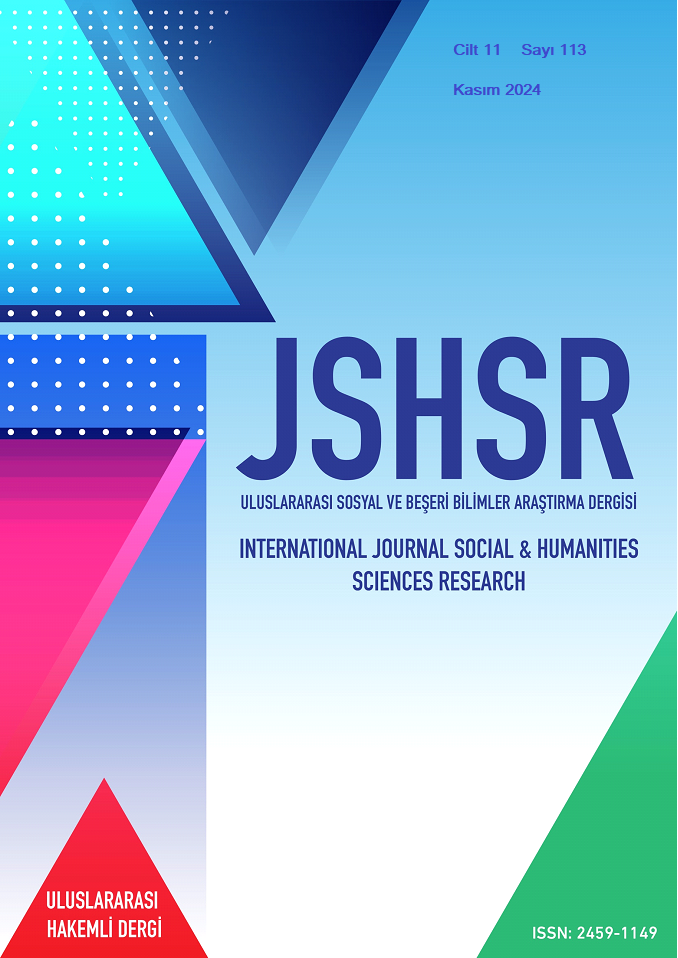The Course of Democracy in the Digital
DOI:
https://doi.org/10.5281/zenodo.14257202Keywords:
Democracy, ParticipationAbstract
In the 21st century world, values, norms and concepts are being transformed due to digitalization that affects every aspect of life, and this situation makes it inevitable that the concept of democracy should be re-evaluated in current dimensions. Especially the presence of digital domains is also affecting the tools of policymakers, and the digitalization of democratic tools is becoming widespread. There are a number of values that make local governments important. Among these values, participation is an indispensable condition (sine qua non) for local democracy. What is important in democratic systems is the participation of the people in matters that concern them. The effectiveness of participation lies in the negotiation of decisions and their realization through consent, beyond just voting. This situation points to the locality of democracy and it is stated that local governments contribute more to the maintenance of democracy in terms of participation opportunities compared to central governments.
With digitalization, democracy in governance has diversified. Digitalization affects citizens' political participation. The study aims to explain the impact of digital tools on citizens' decision-making processes in a digitizing society. Within the scope of the study, the impact of digitalization on political participation will be examined and its reflections on local participation will be explained.
References
Ağaoğulları, M. A. (2013). Kent Devletinden İmparatorluğa. İmge Kitabevi.
Akarsu, B. (2019). Felsefe Terimler Sözlüğü. İnkılâp Yayınevi.
Akkaş, H. H., & Tekir, O. (2013). Demokrasinin Gelişmesi ve Sürdürebilirlikte Sosyal Sermaye (2. b.). Kadim Yayınları.
Almond, G. A., & Verba, S. (1963). The civic culture: Political attitudes and democracy in five nations. Princeton University Press.
Borysenko, Y. S. (2023, June 30). How Does Homo Digitalis Empathize? Anthropological Measurements of Philosophical Research, 23(2), 70-79. https://doi.org/10.15802/ampr.v0i23.283605
Christoforou, A. (2022). Social Capital and Civil Society in Public Policy, Social Change, and Welfare. Journal of Economic Issues, 56(2), 326-334. https://doi.org/10.1080/00213624.2022.2050142
Coleman, J. (1998). Foundations of Social Theory . Belknap Press.
Crick, B. (2002). Democracy: A Very Short Introduction. Oxford University Press.
Dahl, R. A. (2006). A Preface to Democratic Theory. The University of Chicago Press.
Dıamond, J. (2018). Tüfek, Mikrop ve Çelik. (Ü. İnce, Çev.) Pegasus Yayınları.
Gökce, O. (2012). Yeni Medya-Kamuoyu-Demokrasi. E. Sözen (Dü.) içinde, Hepimiz Globaliz Hepimiz Yereliz Gutenberg Galaksi'den Zuckerberg Galaksi'ye (s. 37-54). Alfa.
Heywood, A. (2015). Siyasetin Temel Kavramları. Adres Yayınları.
Hidalgo, O. (2008). Conceptual History and Politics: Is the Concept of Democracy Essentially Contested? Contributions to the History of Concepts, 4(2), 176-201. https://doi.org/10.1163/187465608X363463
Karaca, Y., & Öztürk, N. K. (2019). Yeni Nesil Belediyecilik: Dijital Belediye Uygulamaları. Uluslararası Yönetim Akademisi Dergisi, 2(3), 528-537. https://doi.org/10.33712/mana.649557
Klijn, E. H., & Skelcher, C. (2007, August 17). ‘Democracy and governance networks: compatible or not? Public Administration, 85(3), 587-608. https://doi.org/10.1111/j.1467-9299.2007.00662.x
Marsh, C. (2000). Social capital and democracy in Russia. Communist and Post-Communist Studies, 33(2), 183–199. https://doi.org/DOI10.1016/S0967-067X(00)00003-9
Nur-tegin, K. (2019). Social capital – a topsoil for democracy. Review of Social Economy, 79(2), 166-190. https://doi.org/10.1080/00346764.2019.1640385
Paul, H. (2013, November 8). Local Democracy in a Digital Age: Lessons for Local Government from the Manchester Congestion Charge Referendum. Routledge, 40(1), 82-101. https://doi.org/10.1080/03003930.2013.829457
Paxton, P. (2002). Social Capital and Democracy: An Interdependent Relationship. American Sociological Association, 67(2), 254-277. https://doi.org/10.2307/3088895
Platon. (2018). Devlet. (S. Eyüboğlu, & M. A. Cimcoz, Çev.) Türkiye İş Bankası.
Putnam, R. D. (2001). Bowling Alone: The Collapse and Revival of American Community. Touchstone Books by Simon & Schuster.
Roseland, M. (1992). Toward Sustainable Communities : A Resource Book for Municipal and Local Governments. Ottowa: National Round Table on the Environment and the Economy.
Sairambay, Y. (2020, January 8). Reconceptualising political participation. Human Affairs, 30(1), 120-127. https://doi.org/10.1515/humaff-2020-0011
Schumpeter, J. A. (2003). Capitalism, Socialism and Democracy. London and New York: Rotledge.
Sweeting, D., & Copus, C. (2012, January 1). Whatever happened to local democracy? Policy Press, 40(1), 21-38. https://doi.org/10.1332/030557310X550123
Torrent-Sellens, J. (2023, June 16). Homo digitalis: narrative for a new political economy of digital transformation and transition. New Political Economy, 29(1), 1-19. https://doi.org/10.1080/13563467.2023.2227577
Downloads
Published
How to Cite
Issue
Section
License
Copyright (c) 2024 INTERNATIONAL JOURNAL OF SOCIAL HUMANITIES SCIENCES RESEARCH

This work is licensed under a Creative Commons Attribution 4.0 International License.


